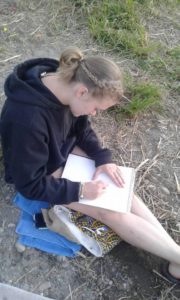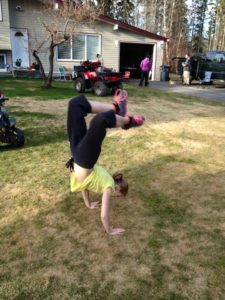 I read my 13-year-old Granddaughter Kaylie’s Blog the other day. She wrote that she steps back from her emotions and examines them as if they were the emotions of a friend. I realized that she was describing an important lesson in mindfulness.
I read my 13-year-old Granddaughter Kaylie’s Blog the other day. She wrote that she steps back from her emotions and examines them as if they were the emotions of a friend. I realized that she was describing an important lesson in mindfulness.
Kaylie writes about thirteen year old stuff, and as you may recall, thirteen year old stuff is pretty painful. It’s tough being thirteen because you’re consumed with how you perceive yourself in the world and how the world perceives you.
If you perceive yourself negatively, and believe others perceive you negatively, being thirteen hurts.
Some of us haven’t learned how to stop being that thirteen year old, consumed with negative perceptions of ourselves. This is why the lesson Kaylie has learned is so important.
A Lesson in Self Compassion
Kaylie writes that she sits quietly in her room and thinks about whatever is bothering her as if she is a third person listening to herself. She then speaks to herself as she would a friend. This, she said, is how she turns her problem into helpful advice for others.
DBT Skill: Observing, Describing, Participating
Although Kaylie doesn’t realize it, she is practicing the basic Mindfulness skill of Observing, Describing and Participating. This skill helps you Step back, Take a moment, Observe, then Proceed thoughtfully (STOP).
skill of Observing, Describing and Participating. This skill helps you Step back, Take a moment, Observe, then Proceed thoughtfully (STOP).
Observe
To observe, still quietly and just notice what you are experiencing, without putting words to it. Notice your emotions and where you feel them in your body. Focus on the five senses; what you see, hear, feel, smell and touch.
Observe your thoughts as if they are leaves floating down the river. Acknowledge the thought, then slowly let it float away as you make room for the next thought. Do not attach yourself to any one thought, feeling, or sensation. Merely observe, acknowledge, and let go.
Describe
After you have sufficiently observed your emotions, describe what you are experiencing, thinking and feeling. Be as descriptive and factual as possible.
When you describe your emotions and thoughts factually, you step back from them instead of being consumed and overwhelmed by them. You stay rational and calm; able to access your inner wisdom. You become the compassionate friend to yourself that Kaylie has discovered.
Participate
Once you connect with your inner wisdom, throw yourself into the moment and choose your course of action, without self-consciousness.
For Kaylie, sometimes the participating is writing about her experience. Sometimes she may phone a friend. Whatever your wise mind tells you to do, do it with purpose and intention.
Mindfulness is a skill that helps us step back from difficult situations so that we use our wise mind and to make wise choices. Wouldn’t it be a gentler world if we could all treat our inner thirteen year old as we would a cherished friend?
For more information check out the related posts and additional resources section below. For specific DBT skills go to DBT Skills in the menu bar.
“I do not want to foresee the future. I am concerned with taking care of the present. God has given me no control over the moment following.”
~ Mahatma Gandhi
Related Posts
3 Easy Steps to Self-Acceptance
